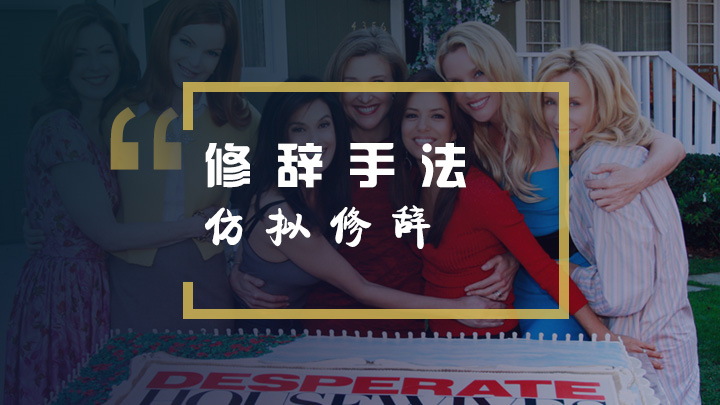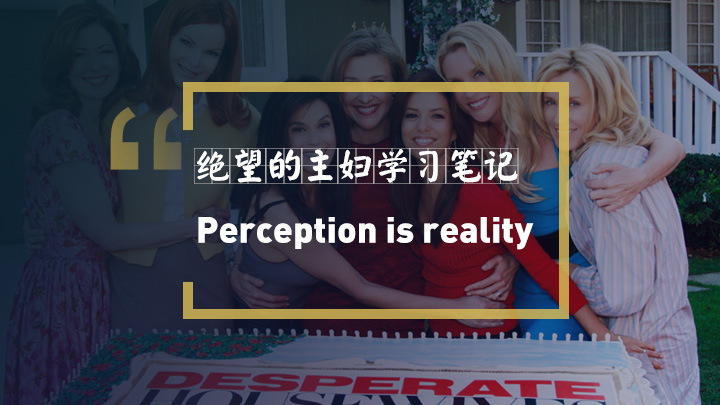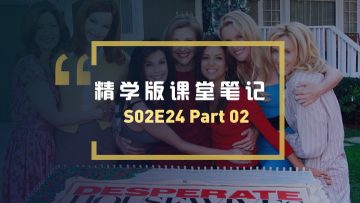看绝望的主妇学英语修辞手法之“仿拟”篇
Parody [‘pærədi]:这是一种模仿名言、警句、诗词、谚语、网络新潮表达的修辞手法,改动其中部分词语从而使其产生新意的修辞。仿拟是一种特殊的修辞手段,模仿某一知名人物,更换现成词语的某个语素,或临时造出新的词(coinage),表达的效果从风趣、诙谐到讽刺、自嘲以至滑稽、恶搞,好比漫画,夸大一段特征,达到幽默的目的。
仿拟的真正作用就是:站在巨人的臂膀上创作,因为有前人的开路,能够让我们要体现的主旨快速打入人心的同时,不失幽默与才情,很多时候都能起到事半功倍的效果。
(Parody is an imitation of a particular writer, artist or a genre, exaggerating it deliberately to produce a comic effect. The humorous effect in parody is achieved by imitating and overstressing noticeable fetures of a famous piece of literature, as in caricatures, where certain peculiarities of a person are highlighted to achieve a humorous effect. We, in our daily life, can employ the above technique to spoof somebody for the sake of fun.)

仿拟在文学作品中,过去经常用于讽刺性批评和滑稽嘲弄;现今用于广告宣传的案例也是层出不穷,而且多数都能给人一种“旧貌换新颜”、“旧瓶装新酒”的意境或情趣。比如:
E.G.1:Go with the flow, soft, swaying shapes, so right for summer. (夏日衣裙广告)
E.G.2:East or west, Zhanggong / Guangzhou cuisine (home) is the best. (东西南北中、好酒在张弓)
E.G.3:To choose it , or not? This is the time to decide. (花露水:碧丽牌 借高雅诗行的结构,塞进微不足道的事情 ,造成表现形式和所写内容的极不协调的效果,以求幽默。)
E.G.4:People respond to two things:pictures and stories/ pain and pressure/ an attrative voice and a sexy body /carrots and sticks. (Suits S01E08 24:00)
E.G.5:There’re two kinds of pain:
Churchill(Armed) to the teeth. (连牙缝音都像邱吉尔)
Give me liberty or give me death. (不自由,毋宁死)
Not all cars are created equal (To be better than anything else or anyone else of the same type. )不是所有的汽车都做工一样、无与伦比。 不是所有的牛奶都叫特仑苏。
这是日本三菱汽车公司为了开拓美国市场所制作的一项广告。广告富有创意、耐人寻味。广告制作人驾亲就熟地运用广告制作惯有的剪接手法,巧妙地把英国剧作家莎士毕业的《威尼斯商人》中的名句“Not all that glitters is gold (闪闪发光物,未必尽是黄金)”和《美国独立宣言》中的第一句话:“All men are created equal(所有的人生来就是平等的)进行剪接”。这则广告是两句名言的完美结合。广告着意于:汽车良莠(yǒu)不一,提醒潜在消费者:外表好看的东西不一定都是珍贵美好的,同时暗示三菱公司在漫长艰苦创业过程中闯出了自己的新路,确立了自己的独立宣言,从而向世人展示其技术先进、造型别致、豪华舒适、轻便节能、廉价实用的三菱汽车,这就是广告的全部内涵。
仿词篇:
E.G.1:I (think)shop, therefore I am.
E.G.2:Behind every great/successful man is a woman rolling her eyes. (Jim Carrey 《冒牌天神》 )
Behind every great/successful man is a woman rolling her eyes” is a jocular saying that has been printed on many images. The woman—a wife or girlfriend—knows the truth behind the man’s success.
E.G.3:The divided states of America.
2016年12月7日,美国《时代周刊》揭晓了“2016年度人物”。美国总统特朗普赫然入列,给他的名号是:President of the Divided States of America.(美利坚分裂国总统),并称他为煽动者。用于嘲讽他在处理种族矛盾、外来移民、富人与穷人、民主党与共和党的零和博弈及乏善可陈。
E.G.4:Britain (Britannia)no longer Rule the Waves.
E.G.5:Show me the your (Money)passion.
All (work)study and no (play) exercise makes Jack a dull boy. (只工作不玩耍,聪明孩子也变傻。)
The concept of something having contradictory qualities to different people has been around a long time. “One man’s meat is another man’s poison” was a 17th century proverb.
One man’s trash is another man’s treasure. = What is useless to one person is valuable to another
Just coming in for a little more fuel. Yup. One man’s sludge is another man’s liquid gold. Well, back to the trenches. (DH S01E20 21:57)
它是谚语“One man’s toxic sludge[slʌdʒ] is another man’s potpourri [ˌpəʊpʊ’riː(混合物、集锦、百花香)] ”的改写体,而这句谚语的源头出自于2000年由朗·霍华德执导、美国喜剧演员金·凯瑞主演的一部电影《圣诞怪杰》。这个谚语的意思与我们中国的一个成语“变废为宝”非常接近。翻译成中文是“在你那里是臭皮蛋,在我这里是香饽饽。”
The noun potpourri refers to a mixture of flowers, herbs, and spices usually kept in a bowl or jar and used for its fragrance. Thus, a potpourri can be any collection of seemingly unrelated items.
E.G.1:But, then again, one man’s tragedy is another man’s treasure, (HOC S04E09 14:02)
E.G.2:I mean, they’ve always been wound a little tight, but I’ve never seen them like that. Then again, who am I to judge? You mean people who live in glass houses shouldn’t throw soda cans? (DH S01E03 32:56)
one swallow doesn’t make a summer:
E.G.3:I can’t justify handing you a promotion in the same day that you lose a huge client. — One client doesn’t make a firm.(S01E01 28:54)
E.G.4:
People who live in glass houses shouldn’t throw stones/soda cans: 这句话来源于欧洲的一句谚语:”People who live in glass houses shouldn’t throw stones.” (人要有自知之明)
我们先看这句话直译过来的意思:住在玻璃屋里的人不应该扔石头。大家都知道将石头砸向玻璃屋,那屋马上会起一个洞。如果你已经身陷玻璃屋,还朝别人扔石头,那不是自找苦头吃吗?举两个现实生活中的例子:
- 你打游戏(比如王者荣耀)自己动不动就千里送人头,还嘲笑别人是辣鸡,那不是等着被喷吗?
- 一个“啃老族”去嘲笑一个“妻管严”,两人在家都说了不算,有意思吗?
这句话的引申意思就是:自己身处于一个被人批评指责的境地,就不应该批评和指责别人。这里让我想到一句大俗话:“自己一身虱子,看别人一身痦子”,Dilettante VS Amateur,半斤对八两,谁也别瞧不起谁? 还是Susan学得熟:“Who am I to judge?” ——没错,人要知趣、要清醒!
这里Mike将“Stone”换成了“Soda can”,是对Susan与Karl两人为谁去捡苏打罐发生争执的一种幽默的调侃。
翻看我们童年的读过的课本,长大后才发现,语文课本里尽是人生。很多人也许会有这样的感悟:“年轻时真的读不懂,读懂的时候发现自己就是书中人,初听不知曲中意,再听已是曲中人了。”回不去的青春,留不住的岁月。
少时不识孔乙己,读懂己是书中人。
醉过方知醉浓,爱过方知情重。(爱过才会心痛)(胡适 1920)




